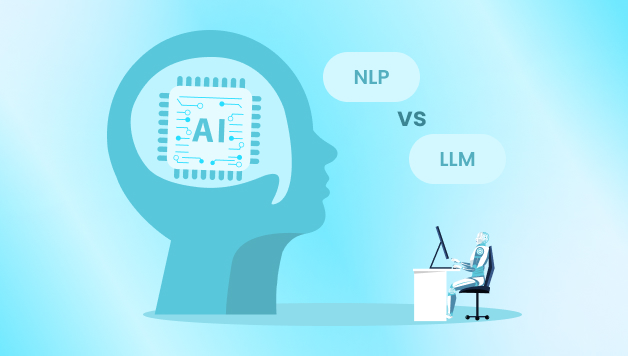As we look into the future of NLP, it’s clear that Large Language Models (LLMs) are poised to transform the landscape of Natural Language Processing (NLP advancements). Traditionally, NLP models were generalized to handle a wide range of topics and tasks. However, the future is taking a more focused direction with the rise of domain-specific LLMs. These models cater to specific industries, improving performance and efficiency by leveraging industry-specific data. Let’s dive into what’s next for NLP and how domain-specific LLMs are changing the game.
Understanding the Current State of NLP
Before exploring the future of NLP, it’s important to understand where the technology currently stands. Traditional NLP techniques have evolved over the years, from rule-based systems to machine learning-based approaches.
However, one key limitation has been the generalization of models to handle all kinds of data. While general-purpose models like GPT-3 have shown incredible promise, their one-size-fits-all approach often lacks the deep understanding needed for industry-specific tasks.
This brings us to the emerging trend of domain-specific LLMs. where models are trained on specialized data sets to optimize performance within a given field.
Whether it’s healthcare, law, or finance, these LLMs for enterprise. NLP can be tailored to understand and process jargon, terminology, and workflows specific to a particular domain.
The Shift Toward Domain-Specific LLMs
What Makes Domain-Specific LLMs Different?
While general-purpose models are powerful, they often need to be fine-tuned for specific use cases. Domain-specific LLMs, on the other hand, are pre-trained with large, domain-focused datasets, which makes them inherently more accurate and efficient for tasks within that domain. For example:
- Healthcare: A domain-specific LLM trained on medical data can accurately. Interpret medical terminology, diagnose conditions, and provide medical advice based on evidence-based practices.
- Finance: In the financial sector, LLMs trained on financial reports, regulations, and market. This trends can assist with risk analysis, investment strategies, and regulatory compliance.
- Legal: A legal domain-specific LLM can analyze contracts, offer legal advice, and assist, with case law research, ensuring compliance with relevant legal frameworks.
Advantages of Domain-Specific LLMs
The rise of domain-specific LLMs offers several advantages over general-purpose models:
- Improved Accuracy: By focusing on a specific industry, these models become more proficient at understanding the nuances and complexities unique to that domain.
- Faster Integration: Businesses in niche sectors can implement domain-specific LLMs faster.
- Cost Efficiency: Since the models are tailored to specific needs, companies can save resources by focusing on specialized tasks instead of building general-purpose models from scratch.
The Role of AI Development Company in Shaping the Future of NLP
As the demand for domain-specific LLMs grows, AI developers are taking on an increasingly important role.
AI development companies are at the forefront of crafting these specialized models, working with organizations to develop solutions that meet the unique challenges of their industries.
From fine-tuning pre-trained models to building entirely new systems, AI experts are essential in ensuring that domain-specific LLMs for enterprise NLP deliver value.
How AI Development Companies Contribute
- Customization: AI development companies work closely with clients to understand their needs and create models that integrate seamlessly into business workflows.
- Training and Fine-Tuning: They train LLMs for enterprise NLP on proprietary datasets to ensure models are as accurate and efficient as possible for specific tasks.
- Maintenance and Upgrades: Continuous improvements are necessary to keep up with changing industry needs. AI development companies provide the support required to maintain model relevance.
NLP vs LLM: The Evolution Continues
In the ongoing debate of NLP vs LLM, domain-specific LLMs represent the next frontier of Natural Language Processing advancements. While traditional NLP techniques remain valuable in many contexts.
LLMs for enterprise NLP are rapidly gaining traction due to their ability to handle large volumes of specialized data with greater accuracy.
Moreover, as the field of Natural Language Processing advancements continues to evolve, domain-specific LLMs are expected to become more prevalent across industries. Creating highly personalized solutions that can better meet the specific needs of businesses.
This specialized approach allows for faster, more accurate, and cost-effective solutions, making LLMs for enterprise NLP an attractive investment for companies looking to stay ahead of the curve.
Conclusion
The future of NLP is heading toward greater specialization. With the rise of domain-specific LLMs, industries are witnessing a shift from generalized language models to highly tailored solutions that provide deeper insights and more accurate outputs.
As companies continue to demand more precision and efficiency, the role of AI development company, in crafting these solutions will be indispensable.
As the field progresses, the integration of domain-specific LLMs will shape the way we interact with AI and automate processes across all industries.
=> Do you want to new Topic? If you Interested, Click Now – Website ideas



